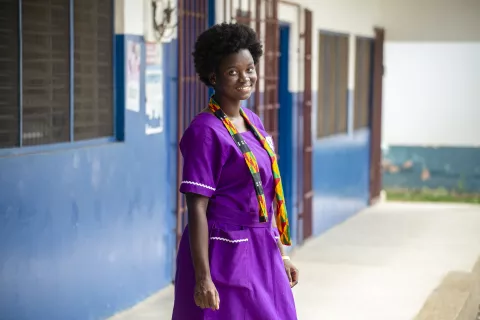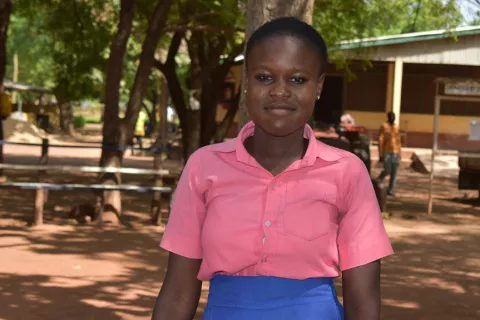A dynamic young Champion of Change in Zebilla community
For every child, empowerment

Meet Isabelle Akupa’alwin, 14 years. She is in form 2 and a Champion of Change in Zebilla community, in Bawku West district.
Through her engagement with peers, there has been a significant change in her school.
Adolescent-Stakeholder Engagement
Through the adolescent empowerment programme supported by Global Affairs Canada with support from UNICEF and RISE Ghana an important training session for adolescents and stakeholders was held in September 2021. This included chiefs, community and religious leaders, parents and teachers to generate dialogue with young people aimed at creating an enabling environment for adolescent to access reproductive health information and services.
“We were sensitized on teenage pregnancy, menstrual hygiene management, adolescent sexual relationships, and the causes of these problems where discussed including disobedience and lack of care by parents. In addition, menstrual shaming, tax on menstrual pads and relationships were all discussed with us,” said Isabelle.
According to Executive Director of RISE Ghana, Ahmed Kariama Awal, this activity is a multi-stakeholder dialogue with chiefs, queen mothers, religious leaders, state agencies, PTA, SMCS men and boys and young people on important subjects concerning adolescent girls which will ensure an enabling environment, for them to access services.
What Lessons were learnt
“This sensitization was a unique opportunity for important people in my community to hear about my concerns as an adolescent girl and also for me to learn from them. I learnt a lot about menstrual hygiene, how to handle my emotions during my menstrual cycle. I was keenly interested in the menstrual hygiene education because of the way boys mock at girls in our school,” said Isabel.
Isabel is one of three outstanding adolescents selected within the Bawku West district to engage with service providers to strengthen knowledge on reproductive health of adolescents in the district.
Isabel’s Leadership
After the training, Isabel took it upon herself to educate all her peers on all that she learnt during her engagement with the stakeholders, including service providers.
“After this training I educated the whole school made up of form two and one students. 77 people in form 2 in 95 people in form 1. I spoke to both boys and girls in my school. I spoke to the girls on how to dress decently, keep good personal hygiene and how to maintain their interactions with boys during their periods. With the boys, I taught them the importance of menstruation to girls and women and why it is normal for girls to menstruate,” said Isabel.
Osman Abdul Rahman , Mathematics teacher at Lamboya Model Junior High School has been delighted to support Isabel’s initiative to engage with her peers to share all the relevant lessons learnt.
He said, “I am very much in support of Isabel and her contribution to the school and I also provided support in mobilizing the students. I saw the importance of this training and as an adult, I knew the importance of sensitization so I made sure it happened. We all learnt, and this is something that should continue since this initiative will help to keep girls in school because it also shed light on the issue of teenage pregnancy.”
Impact of the training
According to Mathematic teacher, Osman, the sensitization was important and has had significant impact on the students.

He said, “The training shed light on the negative behavior of some of the boys which impacted the girls and taught them the things they can do to support girls instead of harming them.”
“The training has changed a lot in the school, I am happy with it and my friends are also very happy with it,” said Isabel. “Since the sensitization, the boys especially who were notorious with this act of mocking girls have stopped. In our school for example, about 40% of the boys had this behavior. Also, they now come to school often since they were not very much interested in attending school,” she added.
Isaiah Ayaaba, 17 years, a student of Lamboya Model Schools and a friend of Isabel, said “When girls are in their period boys should not mock at them. There are boys in the class who were not well exposed so whenever they saw girls in their period, they would mock at them but this training exposed them to a lot of information there training has helped all of us to be well informed we learnt about teenage pregnancies and its causes.”
“We are happy that, girls like Isabel, have made a positive impact on their peers. A two-way conversation has now taken place where adolescents listen to stakeholders and the stakeholders also listen to the adolescent,” said Executive Director of RISE Ghana.




